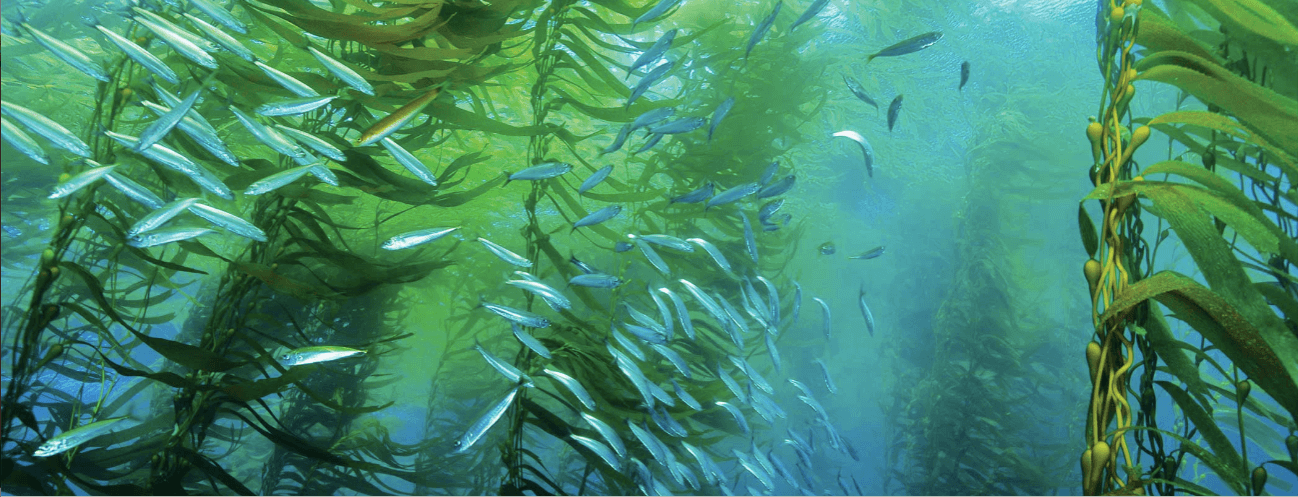When picturing seaweed, days spent at the beach probably come to mind, swimming, only to feel something tickling your feet from the depths below. But seaweed and kelp are a lot more important for our oceans and may be more instrumental in saving our planet than they seem! Enter: Marine Permaculture, a wonderful way for us to increase our carbon handprint on our earth.
The Climate Foundation describes handprints as innovations that can help our planet. Knowing this, the goal is to make our carbon handprints larger than our carbon footprints. But we hear you asking, what is Marine Permaculture? Put simply, it involves the creation of ocean forests of kelp and seaweed. The fastest types of brown seaweed regenerate at a rate of half a metre per day, making it the fastest growing tree on the planet, which is extraordinary! This means that planting and cultivating ‘forests’ of kelp in the ocean are one of the most sustainable ways of rebalancing our oceans and our air.
Seaweed draws CO2 from the air and ocean, facilitating a drop in ocean temperatures and allowing more to be absorbed from the atmosphere. As a result, our oceans will become less acidic and the heat created from global warming declines. Marine permaculture is an easy way to better facilitate the upwelling that occurs in oceans. Upwelling happens when the water in the ocean is circulated, bringing nutrient-rich water up from the ocean floor. With the rising ocean temperatures, there is a barrier stopping the nutrient-rich water from properly reaching the ocean’s surface. Organisms such as krill and plants like seaweed rely on this nutrient-rich water to cultivate and thrive, and without it supplies will drop in numbers. This, in turn, will affect entire ecosystems and possibly entire species in our oceans. However, not all hope is lost!
Filmmaker Damon Gameau talks to Dr Brian Von Herzen, Executive Director of The Climate Foundation, about Marine Permaculture in the documentary 2040.
How is it created and maintained? Creating a base for kelp and seaweed forests is easy and sustainable, only requiring maintenance from humans up to every three years. It uses marine permaculture arrays (MPAs), which are lightweight latticed structures that are submerged about 25 metres below sea level. Kelp and seaweed can then attach onto it, growing on its own. Buoys are attached to the MPAs, which powers pumps that work from the rise and fall of the waves. These pumps work to bring up the nutrient-rich water from below which of course works to help the seaweed to grow. This then forges the way for an ecosystem to build itself back up, reintroducing organisms and marine life back into the area, both to live within the MPAs or to remain nearby.
Is there anything being done in Australia? Much like kelp and seaweed worldwide, a lot of what has been growing off the coast of Tasmania has died due to the rising sea temperatures. The University of Tasmania reports that roughly 95% of the kelp forests around Tasmania have been lost over the past few years. This has led to the Australian Government listing them as an endangered marine community, the first of its kind in Australia. The team behind the 2040 documentary along with The Intrepid Foundation and The Climate Foundation have been working with the University of Tasmania to create the first seaweed platform in Australia, off the coast of Tasmania to replace what has been lost. Along with this, there will be testing of the current kelp varieties that have remained healthy and strong. From this, there is a possibility of regenerating the forests that have been lost by using a species of kelp or seaweed that is better adapted to warmer ocean temperatures.
Together, both of these initiatives have the potential for many different uses. As outlined by Pro Bono, the forests and regenerating what still grows will provide food, fuel, fertiliser, protection for nearby coral, habitat and cooler surface temperatures in the ocean. Not to mention the drawdown of CO2 that we have already discussed! How can I help? As helpful as Marine Permaculture is, it will be the most helpful and get the most reach with a little help from the global community. The most direct way to help this initiative is to donate to the cause via The Intrepid Foundation’s fundraiser . They are matching all donations dollar for dollar, aiming for $350,000. The proceeds will, of course, go towards the creation and maintenance of the floating kelp forests.
For more information on Maarine Permaculture and to do your bit, check out the documentary 2040 in cinemas, or, alternatively, host a screening with Fanforce. Do your bit for the oceans and Take 3 for the Sea when you visit, take part in Plastic Free July any day of the year which will, all in turn, reduce the amount of plastic ending up in our oceans.
*Main Image Credit: Brian J Skerry, from Project Drawdown

